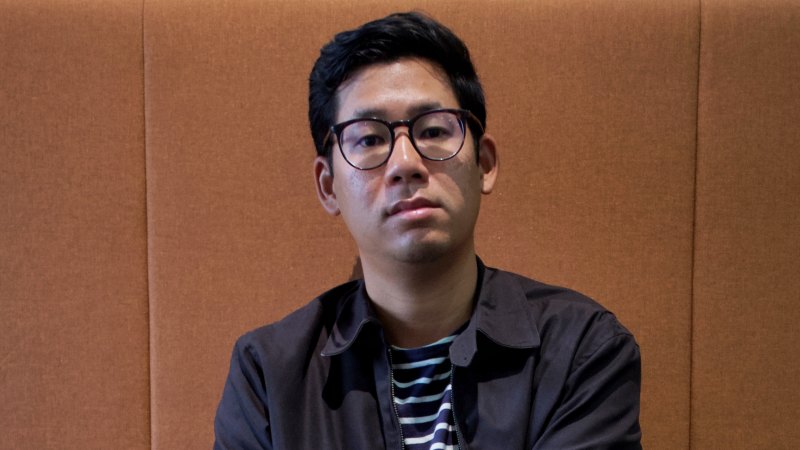Save articles for later
Add articles to your saved list and come back to them any time.
FICTION
Anam
André Dao
Hamish Hamilton, $32.99
In the winter of 1986, Toni Morrison was invited to speak at The New York Public Library. “All water has a perfect memory and is forever trying to get back to where it was,” she noted. “Writers are like that: remembering where we were, what valley we ran through, what the banks were like, the light that was there and the route back to our original place.”
Andre Dao’s novel Anam took him 12 years to complete.Credit: Luis Ascui
Reading André Dao’s Anam feels like stepping into this water, which gently pulls us into a deepening flow of memory. Early on, the narrator imagines a “machine for perfect remembrance”, which summons ghosts to tell a complete story of their lives. Anam is replete with such ghosts, but the remembrances it is filled with are imperfect and incomplete – necessarily so, for it is a monument to Dao’s grandfather, who survived 10 years as a political detainee in Chi Hoa prison in Vietnam.
As Anam’s narrator asks: “What should we keep uppermost in our minds when translating the suffering of others?”
In his search for a way to honour his grandfather’s story, and the stories of others, Dao’s elegiac debut took 12 years to complete. He finally chose to write the book as autofiction, and it is through this form – suspended between fiction and autobiography – that he creates a sprawling work that untangles the endlessly knotted problems of memory, inheritance and home. As the narrator notes, “the ground beneath us is not firm”.
Credit:
Fictional worlds are inherently delimited – soothing for those who seek refuge from life’s chaos with a satisfying denouement. Yet the autofictive mode, precarious and permeable, plays with such limits, and Dao uses it to refuse expected narratives of diasporic assimilation or belonging.
“I had thought my grandfather’s stories and images were a history of a place called Vietnam,” the unnamed narrator notes. “But now I realise he was always speaking of some other place, not entirely coextensive with the thin, S-shaped spit of land between the sea and the mountains that bears that name on our maps.” The narrator names this place “Anam”.
The novel is narrated by a young father who has moved from Footscray to Cambridge to complete his Master’s in law. He lives with his partner and their baby, and spends his time studying and walking the university town. The narrator is distracted from his studies. He explains that the guiding principle of “Anam” is “anamnesis” – in his words, “the Ancient Greek belief that our eternal souls have forgotten all there is to know, or the Catholic act of salvation through worshipful remembrance”.
He omits a third association – anamnesis as a literary technique of recollection or reminiscence, most famously deployed in that first morsel of Proust’s madeleine. And in Proustian fashion, the narrator’s mind moving “not with the logic of the body but the illogic of the dream”, his attention strays to his time as a human-rights lawyer for refugees imprisoned on Manus, then slides into a memory of his grandfather imprisoned in Chi Hoa, and then on and on again still, until the libraries of Cambridge dissolve into Hanoi, Paris, Melbourne, Saigon.
It feels absurd to flatten Anam into such particulars; slipping as it does between generations, conversations, speculations and stories, it is not simply a book about memory; rather, the novel’s looping form becomes its own lesson.
Some sentences are so lyrical that they fill almost a page before finding an end; some chapters are so precise they barely span a page. As this collection of fragments grows, simultaneously falling together and apart, the text becomes palimpsest and archive, returning again and again to questions that haunt the novel – how might one take seriously “the life of the mind”? How might one write the Other ethically, or commit the self to the page? How might we find home – or, perhaps, how might we live an ethical life, on unceded land?
The text is thick with references to other writers and philosophers – Alexis Wright, Tran Duc Thao, Jacques Derrida, Simone Weil, Frantz Fanon – in a spirit of intellectual community that rejects the notion of singular genius or perhaps even plain old narcissism, a critique often levelled at writers of autofiction.
Of course, in a book so aware of itself as a book, the narrator anticipates criticism: “Why don’t you just say what you mean? And why can’t you say it without referencing someone else?” Yet it is only alongside these thinkers that one can sustain such a critical undertaking. In an author’s note, Dao writes: “This novel converses with, borrows from, remembers and forgets many traditions … a comprehensive list of all my sources is neither possible nor desirable: one of the concerns of this novel is how we deal with our inheritances, literary or otherwise.”
Nearing the end of Anam, in a letter to his daughter, the narrator writes that the city of Hanoi is a swamp, built on lakes – “it’s all pretty enough, like a postcard, but in the end it will sink back into the miasma”. So the water, with its perfect memory, swirling and suspended, is still trying to get back to where it was.
Anam is a rigorous and generous book, which will sit with you well after reading. “We cannot transcend ourselves,” the narrator says. “Yet it is the promise of such transcendence that brings us back to literature.” Anam is transcendent.
Andre Dao is a guest at Melbourne Writers Festival (mwf.com.au) and Sydney Writers’ Festival (swf.org.au). Leah Jing McIntosh is founding editor of Liminal magazine
The Booklist is a weekly newsletter for book lovers from books editor Jason Steger. Get it delivered every Friday.
Most Viewed in Culture
From our partners
Source: Read Full Article




